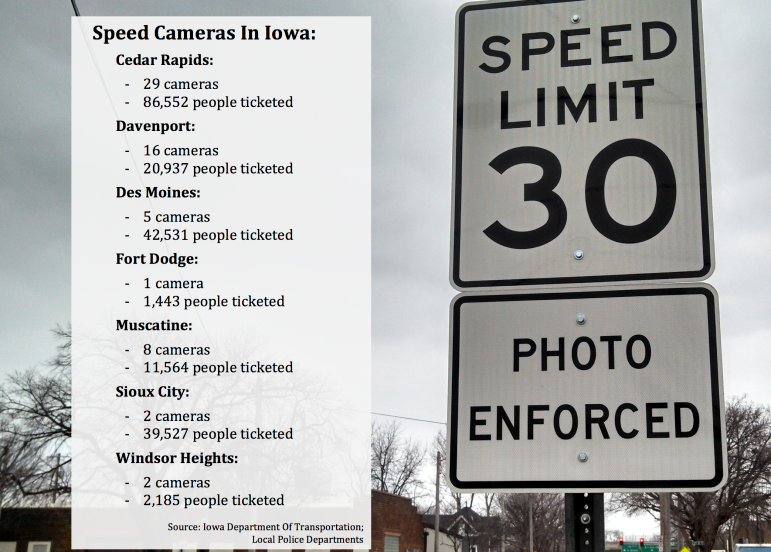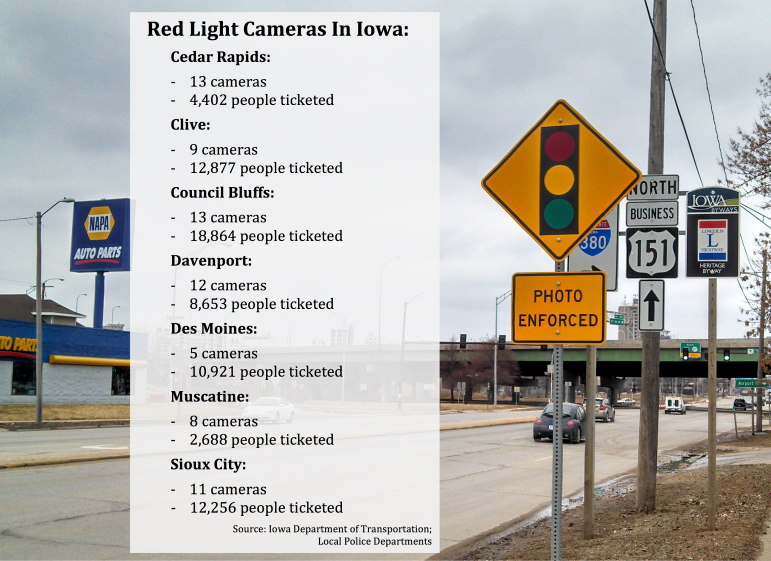Transportation policy doesn’t often generate passionate public debate, but everyone seems to have a strong opinion about traffic cameras. Last week the non-profit news service Iowa Watch published an excellent piece on how traffic cameras are used in Iowa and the conflicting evidence about whether they improve public safety. Kelsey Block’s article inspired me to compile arguments for and against this law enforcement tool.
How traffic cameras are used in Iowa
For those not familiar with IowaWatch.org, it’s an independent, non-profit news organization of The Iowa Center for Public Affairs Journalism, focusing on explanatory and investigative reporting. Kelsey Block, a journalism student at the University of Iowa, wrote the March 20 article titled, “Contradicting Studies On Traffic Camera Safety Impact Make Regulation A Judgment Call.” I recommend clicking through to read the whole piece. Lauren Mills of IowaWatch.org created these graphics to show how various Iowa cities have been using traffic cameras to enforce speed limits and discourage drivers from running red lights. I was surprised by how many tickets have been issued.
Arguments for banning or restricting the use of traffic cameras
Republican State Senator and IA-03 Congressional candidate Brad Zaun is has been a leading advocate of banning traffic cameras, in part because he once got a speeding ticket after his son drove too fast through Cedar Rapids. So far, he has been unable to get enough of his fellow lawmakers to go down this path. Many House and Senate members previously served in city or county government and are sensitive about “local control.” An Iowa House bill seeking to restrict but not prohibit how cities can use traffic cameras died in the legislature’s second “funnel” earlier this month.
Speaking to IowaWatch.org, Zaun indicated that he will not give up this fight:
Zaun, the Urbandale senator, is a member of the Transportation Committee and a former Urbandale mayor. He said he favors banning traffic enforcement cameras altogether. His concerns include the lack of due process and the devices’ accuracy.
“You are presumed guilty first with these traffic enforcement cameras,” Zaun said. […]
Zaun said he recognizes that the cameras have reduced accidents along Interstate 380 in Cedar Rapids, but that does not change his stance because so many more studies prove the opposite.
“Ultimately I want these banned. This is a nonpartisan issue, there are Republicans and Democrats who are equally frustrated,” Zaun said. “It seems like the older generation doesn’t have a problem with the cameras, and the younger people really don’t like them. It’s more of an age discrepancy than a partisan discrepancy.”
Those who want to ban traffic cameras often cite research published at Iowa State University two years ago. But Block noted that studies are far from conclusive:
Although much of the debate focuses on city governments’ intent when using them, or on fairness to motorists, studies focusing on the cameras’ merits as a safety tool show that when they hurt, or help, depends on where and why they are used.
When used as a general enforcement device for any or all intersections or speed location, they produce reliable revenue streams even though they are not effective improving safety, and, in some places can endanger safety. However, when used at specific locations to address a specific safety problem the devices produce good results, an analysis of various studies shows. […]
Studies show cameras help in some intersections and location, but not in others. And, although a 2012 Iowa State University report confirms that an additional second of yellow-light time probably would reduce wrecks by 50 percent, that reduction would last for a short while before motorists returned to their old habit of trying to beat the yellow, traffic safety experts argue.
“So increasing (it) may improve the safety for a while,” said Steve Gent, director at the Iowa Department of Transportation’s Office of Traffic and Safety, “until drivers adapt, at which time the safety would go back to the pre-test levels.”
The Iowa DOT recently enacted new rules on how local governments can use traffic cameras in certain locations. You can read the full text here (pdf). The new rules force cities to show that they have explored and employed other methods to enforce traffic laws and require an annual review by the Iowa DOT. The city of Sioux City is seeking to overturn those regulations in court.
While Iowa DOT officials acknowledge automated enforcement of traffic laws may be appropriate in some locations, civil libertarians make a broader case based on legal principles. The ACLU of Iowa explains its position as follows:
Dubious Safety Data
The safety data that is often cited is actually conflicting. In some places, for example, traffic cameras have led to an increase in rear-end accidents as drivers rush to slam on the breaks to avoid an automatically generated ticket.Just as a matter of common sense, traffic cameras are unlikely to protect against many of the most dangerous drivers. A traffic camera is far less likely to stop a drunk driver than flesh-and-blood police. Also, because the citation information collected by cameras doesn’t get reported to the Iowa Department of Transportation (unlike speeding tickets issued by officers), it isn’t effective in flagging repeat high-speeders.
Due Process Issues
We’re concerned that car owners get ticketed, rather than the actual driver (a child, a spouse, etc.). There is also a problem of insufficient notice when cities fail to post signs in areas where drivers are approaching traffic cameras.It seems unfair that traffic cameras ticket small offenses, such as stopping slightly over the white line-offenses officers are unlikely to ticket.
We’re troubled by the potential for localities to become reliant on the revenue the cameras generate. Such reliance has led to misuse in other states, where some cities have shortened yellow lights to increase violations and increase revenue.
Creating a Surveillance Camera Culture
Perhaps more than anything, we oppose the “Big Brother” approach to governing that traffic cameras embody. Traffic cameras allow for government monitoring of our driving behaviors at a scale that exceeds what is possible when using traditional traffic enforcement methods. Some key legislators have described them as a step toward a “surveillance camera culture” that should give us all pause.
The last argument is the strongest in my opinion, but I haven’t seen evidence that any cities are using the cameras to keep track of where and when specific individuals are driving on certain roads.
In 2006, the ACLU of Iowa challenged the city of Davenport’s use of speed cameras. The Iowa Supreme Court rejected that lawsuit but left the door open to other legal arguments against traffic cameras.
Arguments against restricting the use of traffic cameras
Public safety is the number one argument for allowing cities to continue to use traffic cameras without new limits. From KTIV’s report on the IowaWatch story:
Authorities in Sioux City said these studies over-simplify things and their numbers speak for themselves.
“Traffic accidents on the interstate are down a third since we’ve put in the speed cameras. Traffic accidents on the intersections with red light cameras are down 49-percent. Traffic accidents across the city are down 15-percent,” Capt. Mel Williams, of the Sioux City Police Department, said.
And, Captain Williams said the city was deliberate about where they installed the cameras.
They looked at where the accidents were happening, they asked officers where they had problems with drivers running red lights, and intersections where it may be more difficult to enforce the law.
But, the Iowa Department of Transportation said before a city installs traffic cameras, there are many other counter-measures to try first, like adjusting the speed limit and taking a second look at turn lanes.
And, even though the DOT said the cameras are not always the best option, sometimes they can work.
Whether or not you support the use of traffic cameras, the state arguably has no role in telling local government how to enforce traffic laws. The city of Clive is taking down its cameras later this year, after analysis showed more accidents have been happening at intersections with red-light cameras. Why not let local governments and the citizens to whom they are accountable keep setting policy in this area? If members of the public don’t like the cameras, they can vote in a new mayor and city council to remove them.
Sioux City’s lawsuit argues that the Iowa DOT’s new regulations are an unconstitutional infringement on home rule authority. The Des Moines Register’s editorial board agreed in an unsigned editorial published on March 17:
Sioux City’s lawsuit also raises a novel issue: The DOT’s rules are so broadly written, city lawyers argue, the city may be prohibited from using standard radar equipment that is common in police cars.
The city’s patrol cars are equipped with “integrated radar and video cameras which record the speed and images of an individual violating traffic or speed laws,” the city said. “Unfortunately, these well-equipped manned police vehicles now fall under the rules’ definition of an ‘automated traffic enforcement system.’ ”
The automated camera rules go well beyond the Iowa Department of Transportation’s mission of building and maintaining public roads and bridges. Cities and counties are primarily responsible for enforcing the traffic laws within their jurisdictions, and the DOT has no reason to prescribe exactly how local governments do that job.
Any relevant comments are welcome in this thread.


